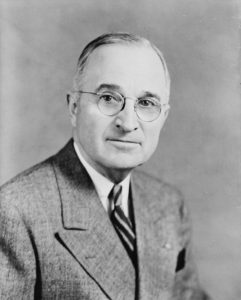 Indicates He will Dispatch American Units if U. N. Organizes an International Force; Vandenberg Says He Wasn’t Consulted
Indicates He will Dispatch American Units if U. N. Organizes an International Force; Vandenberg Says He Wasn’t Consulted
By Jack Werkley
WASHINGTON April 22.-President Truman indicated today that he will invoke his authority as commander in chief of the armed forces to send troops to Palestine if the United Nations organizes an international police force for the task.
The President emphasized at his press conference, however, that the United States would send troops only as a part of a United Nations police force. This is the position taken by the United States in the current Palestine discussions in the U. N. General Assembly at Lake Success.
Mr. Truman was questioned on the authority of the President to send troops without Congressional approval and was reminded of Congressional criticism of the American offer to contribute its “fair share” of police troops without consulting Congress.
The President said he wondered what those who questioned his authority to send troops to Palestine knew about the authority of the commander in chief to send troops anywhere. He cited the historical precedents of Presidents who sent troops to Mexico and Haiti without Congressional approval.
Asked if the United States would be ready to send troops to Palestine along with Soviet troops, Mr. Truman said he had no comment except that the United States was ready to contribute its share of an international police force.
Earlier, Senator Arthur H. Vandenberg. Republican, of Michigan. chairman of the Senate Foreign Relations Committee, told the Senate that the President probably has the authority to send troops to Palestine without Congressional consent.
Senator Vandenberg said, however, that the Presidential authority in this instance is “in the border line area of the twilight zone of Presidential authority.” Senator Vandenberg was responding to question growing out of Congressional criticism of the American offer to contribute troops to a police force for Palestine.
Senator Owen Brewster, Republican, of Maine, said he had been advised that the offer was made in the U. N. General Assembly’s special meeting on Palestine at Lake Success after consultation with foreign policy leaders of the Senate.
Senator Vandenberg said that he had not been involved in “anything approximating a consultation” on the Palestine matter with Warren R. Austin. the United States representative in the U. N., or any Administration official.
The discussion about sending troops to Palestine stemmed from the statement of Mr. Austin before the General Assembly last Tuesday in which the United States offered to contribute its “fair share” of troops to a Palestine police force on a number of conditions.
The force would have to be for the purpose of implementing the temporary trusteeship for Palestine proposed by the United States. It would require the reaching of a truce between the Arabs and the Jews. Other nations would have to contribute troops.
Under the American proposal, the General Assembly would select the nations to contribute troops by a two-thirds vote. Mr. Austin has said that so far no other nation has been found willing to contribute troops for the trusteeship plan.
It is considered doubtful in official circles here that the Assembly would nominate the Soviet Union as a nation to contribute troops. The Soviets have boycotted the Trusteeship Council of the U. N.
A number of members of Congress have criticized the American action offering to make troops available for a police force without consulting Congress. The 1945 United Nations Participation Act, which covers American participation in the U. N., authorized the President to negotiate agreements for providing American troops for the proposed permanent U. N. international police force.
A deadlock among the major powers has prevented organization of the permanent force. The agreement under which the United States would provide troops for this force is subject to Congressional approval, under the 1945 U. N. act.
The President has some powers under the act to provide troops to the Security Council of the U. N. without getting Congressional authority. But the trusteeship agreement would not be covered by these provisions, in the view of some officials.
Therefore, it was explained, the President, rather than invoking his authority under the United Nations act, probably would rely on his constitutional authority to send troops anywhere as commander-in-chief to protect American citizens and property. Experts said this authority is in no way limited by the United Nations act.
The President’s statement caused some surprise today since it had been widely believed that on an issue such as sending troops to Palestine he probably would want Congress to share the burden of deciding the question.